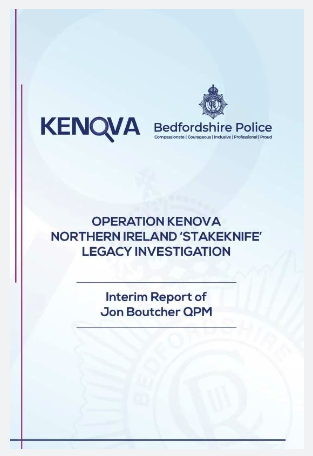The Provisional Irish Republican Army (PIRA) used torture, inhumane behaviour and murder as a deterrent against people working with the security forces. It was ‘often unconcerned as to the actual involvement of its victims in assisting the security forces’, the Operation Kenova Interim Report said, published last week by the Police Service of Northern Ireland (PSNI).
The 200-page report said that the ‘republican leadership gave carte blanche to its ISU (internal security unit) to commit acts of torture and murder’, without internal accountability.
The ISU made some false promises that, should they confess to assisting the security forces, it would stop mistreating them. Victims were encouraged to attend Sinn Féin fronted press conferences to criticise the security forces for recruiting agents as propaganda exercises. Typically, PIRA did not usually live up to its undertakings and executed many of those who made admissions in a vain attempt to stay alive, not necessarily because they had assisted the security forces, the report said.
Context
The report arose from what it has termed ‘continuing failure of governments, public authorities, political parties and those who fought in the Troubles to acknowledge properly the hurt inflicted on the families of those who were murdered, or to provide them with a meaningful examination of the circumstances of their deaths’, which would not be tolerated elsewhere in the UK, the investigators pointed out. The report gave background: Republican terrorists were responsible for 60 per cent of the overall Troubles killings, loyalists for 30pc and the security forces for 10pc. Overall, the Provisional IRA was responsible for 87pc to 90pc of total security force deaths during the conflict. During PIRA’s campaign in England, it was responsible for at least 488 incidents causing 115 deaths and 2,134 injuries. It also carried out attacks in Belgium, the Netherlands, the Republic of Ireland and West Germany. Between 275 and 300 PIRA members were killed during the 30-year conflict.
About the unit
PIRA’s ISU had several functions: vetting new recruits; reviewing failed or compromised operations for any evidence of security breach; and investigating, interrogating and debriefing suspected agents; and killing or otherwise punishing those found guilty by PIRA ‘court martial’. PIRA usually killed alleged agents by shooting them in the head, hence the ISU becoming known as the ‘Nutting Squad’. It left many of its victims’ bodies in public to deter others.
Kenova has established that some of those alleged by PIRA to be agents were not working for the security forces. Indeed, the motivation behind allegations that some people were agents was often linked to PIRA hierarchal disputes, clashes over PIRA criminal activities and, on occasion, even intended to eliminate partners for those involved in extra-marital relationships.
The report went on: “Some of the PIRA senior leadership who commissioned the ISU would later be active in seeking fairness and human rights protections. There is a stark contrast between their public position and the wanton use of torture and murder against people from their community who were often innocent of the accusations made against them.”
As for the use of agents by the security forces in Northern Ireland as informers, over the course of the Troubles from the late 1960s when Kenova begins its study, it ‘was not the subject of any meaningful, effective or enforceable legal or policy framework’. In lieu of any national legal or policy framework, the Army and MI5 produced their own internal guidance documents which purported to exclude the use of criminal agents while simultaneously contemplating that this might be appropriate.
The interim report does not reveal the identity of Stakeknife, the code-name of an Army agent inside the Provisional IRA, due to the Government’s policy of ‘Neither Confirm Nor Deny’ (NCND), but the report sets out that it’s likely that agent’s crimes as an agent resulted in more lives being lost than were saved. Former Kenova lead Jon Boutcher, who’s since become Chief Constable of PSNI, has called for both the Government and the Republican leadership to apologise to the families of those who lost loved ones suspected of being state agents during the Troubles. Sir Iain Livingstone, the retired former Chief Constable of Police Scotland, now head of Kenova, said next will come ‘specific reports to individual families, to provide clarity on what happened to their loved ones, the truth they have been denied for so long’, and then a final report.
Visit the PSNI website for the Kenova interim report.










